Marketplace or Directory? Which One Makes More Money?
So, you have an idea for an online platform that connects suppliers and buyers in a specific industry. But wait—should it be a marketplace or a directory? Aren’t they basically the same thing?
Not quite. While they seem similar on the surface, the differences in revenue models, operations, scalability, and difficulty of execution are massive.
Let’s break it down.
The Core Difference: Transactional vs. Informational
- A marketplace facilitates transactions between buyers and suppliers. The platform acts as the middleman, managing payments, orders, and often logistics.
- A directory is essentially an organized list of suppliers that buyers can browse. The transaction happens outside the platform, with no direct involvement from the directory itself.
Think of it like this:
- Marketplace = Amazon (You buy directly on the platform.)
- Directory = Yelp (You find a restaurant, but you call and book yourself.)
Revenue Models: Who Makes More Money?
Here’s where things get interesting.
Marketplaces Make More per Transaction—But It’s Harder
A marketplace typically makes money through:
- Commission per sale (Amazon, Airbnb)
- Listing fees (Etsy, some job boards)
- Subscription fees for sellers (Amazon Prime for sellers, premium marketplace access)
- Service fees for buyers (Uber, Fiverr)
Since a marketplace is deeply involved in transactions, it can extract more value per user. However, convincing suppliers to hand over a percentage of their sales is a challenge. Plus, you’re responsible for dispute resolution, refunds, and quality control.
Directories Are Easier to Monetize—But Have a Lower Ceiling
A directory typically makes money through:
- Advertising (Google Ads, featured listings)
- Subscription fees for suppliers (LinkedIn Premium, Yelp Enhanced Profiles)
- Lead generation fees (Thumbtack, HomeAdvisor)
Since directories don’t handle transactions, they have less operational complexity. But they also make less per user compared to marketplaces. You’re selling visibility, not direct value from a transaction.
Suppliers & Buyers: Who’s Harder to Attract?
Both marketplaces and directories face a chicken-and-egg problem—you need suppliers to attract buyers and vice versa. But the difficulty varies.
Marketplaces: Suppliers Need to Be Fully Onboarded
- You must convince suppliers to list products/services and integrate into your payment system.
- There’s a high activation barrier—suppliers need to trust your platform with payments and customer management.
- Quality control matters. Bad suppliers ruin the entire marketplace.
Directories: Easier to Onboard, Harder to Retain
- Adding a business to a directory is easy—sometimes even automatic (Google My Business scrapes data from the web).
- Retaining suppliers is tough. If they don’t see results (leads, clicks, calls), they won’t pay for premium features.
- Buyers can bypass you. If they find a supplier’s contact info, they might never visit your platform again.
Which One Is Harder to Build?
Short answer: Marketplaces are much harder to build.
Marketplaces Are Harder Because:
- You have to build trust on both sides (buyers & sellers).
- You must handle transactions, refunds, and customer disputes.
- You need strong technology (payment processing, order management, messaging, etc.).
- Suppliers won’t just “list and forget”—they expect customer support and ongoing improvements.
Directories Are Easier But Have Their Own Challenges:
- You need a constant flow of new businesses.
- Buyers may find suppliers and leave, without clicking on ads or paying for premium features.
- Revenue is spread thin unless you have massive traffic.
Which One Scales Better?
- Marketplaces scale better if you get it right. If buyers trust your platform and suppliers rely on your infrastructure, you own the transaction flow (Airbnb, Uber, Amazon).
- Directories can scale fast but hit a plateau. Unless you keep expanding into new niches or geographies, growth eventually slows down.
Final Verdict: Which One Should You Build?
- If you want higher revenue potential and are ready for a long, hard battle, build a marketplace.
- If you want something easier to launch with a lower risk, start with a directory.
Both models work—but understanding the difference can save you years of wasted effort.
Now, which one are you building?






